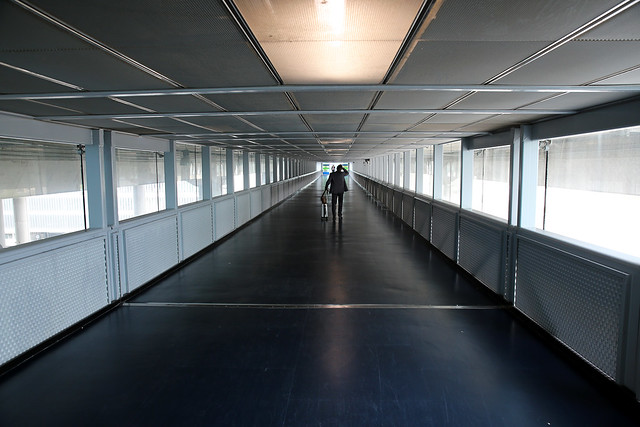Student and lonely (3): ‘It’s really hard in Nijmegen’
-
 Beeld: schermpeter42 via Flickr (CC)
Beeld: schermpeter42 via Flickr (CC)
One of the biggest problems in modern student life is loneliness, also for internationals. It is much talked about by university officials and student representatives, but what is it like for students? Vox interviewed some of them about being lonely. This time: Borjan, from Macedonia.
Borjan has been here for almost 4 years. He studies Psychology and is in his third year. He says that during his time here, he has definitely felt lonely sometimes. The Netherlands is a hard country to live in for many internationals, he says: ‘it’s always hard when you can’t just go out on the street, into the community, and talk to people. The Dutch don’t really interact outside their group and you always have to plan meetings really well. Also, you don’t understand what is said outside, not even at university. But the Netherlands in particular, maybe even specifically Nijmegen as well, is pretty hard.’

Nijmegen has its very Dutch community and an international community, says Borjan. ‘And they really don’t go together at any point. They have completely different spaces, where they interact.’
He notices that at university, but also in his work as a dishwasher in a restaurant. There, interacting with the Dutch is also not that easy, mostly because of the language barrier. ‘At work, the people I interact with are completely different in what they say and how they act in comparison to people from university. There are people who never really needed to learn English so that also creates a barrier. ’
Shipped off
Borjan did not want to stay in Macedonia, so he looked for an English biology programme. He first studied Life Sciences at the HAN. ‘When I arrived I was very optimistic, I thought that the Netherlands had a very internationally-oriented society. So I came here and there were Italians and Spanish people, and people from Luxembourg, and people from Germany.’
They all lived in Vossenveld. ‘Shipped off to the middle of nowhere. The HAN had its own living groups and all the international Life Sciences people were just living together. We weren’t really interacting with any Dutch people, apart from the very few who were taking some courses from the English track.’
No social life
Later, Borjan moved to Hoogeveldt and switched to Radboud to study Psychology. By then, he started feeling lonely because of stress. ‘First, I stopped working for a bit to concentrate on studying. I came back to work when I got on top of my studies. But then with work and studies I basically had no social life. You have people that you meet at university, but they are also at university to study. You don’t actually meet the real people, everyone is just stressed. It’s different from when you get to hang out in your down time.’
‘It’s good to appreciate friendships with people for the time it lasts instead of focusing on feeling lonely.’
It also did not help that all his fellow students from HAN left the city, because people weren’t happy with the study programme. ‘So at the end of the summer, basically everybody I knew went to different cities and countries. And I was working the whole summer here to afford the next year.’
He did not really feel the need to do anything about it. ‘I’ve switched my lifepath before several times. And when that happens so many times, you’re just like “Ok, again”. It’s good to appreciate friendships with people for the time it lasts instead of focusing on feeling lonely. There’s gonna be somebody else. There’s always cool people around.’
Mingle
Borjan thinks it would be good to combine the corridors in dormitories. ‘That way, the Dutch students, the Germans, the internationals are all living together. At Hoogeveldt it’s especially bad, because it’s highly improbable for you to mingle with people from different cultures.’
How the coming year is going to be? ‘Ask me again in half a year’, he says, laughing. ‘What happened at HAN, is going to happen again, many of my friends are leaving. It’s really hard in Nijmegen. I’ve been to other places in the Netherlands, and it wasn’t as hard to talk to people as it is here. Maybe they are more internationally oriented. The best way to socialise in Nijmegen is through social media, finding international gatherings or potlucks through Facebook. I haven’t really been to them, but I’ve heard from fiends that they are pretty nice.’




Unclear wrote on 25 juni 2019 at 13:43
In my experience, the easiest way to mingle with ‘locals’, is to learn their language. This guy seems to be at least somewhat aware of that, but this article doesn’t make it very clear if he has taken any steps to learn the (in this case) Dutch language.
Pieter wrote on 25 juni 2019 at 17:54
Exactly, learning the language is something you should start before moving somewhere else. The Dutch on average speak English well; but at the end of the day most of them prefer to speak Dutch (myself included).
If you’re an international: Ask yourself the question, would a Dutchman survive in your city/village, without the local language? And what would you give as advise to this Dutchman?
Merida wrote on 14 september 2019 at 20:56
A Dutch person would survive just fine anywhere in the world. He’s obviously made the effort to learn English really well. Besides, I think the point of the text is to help students integrate better while on studies, not their ability to learn Dutch. Not everyone has the priviliedge if time and resources to learn an additional language while studying and working. I find your comment quite xenophobic and nationalistic.